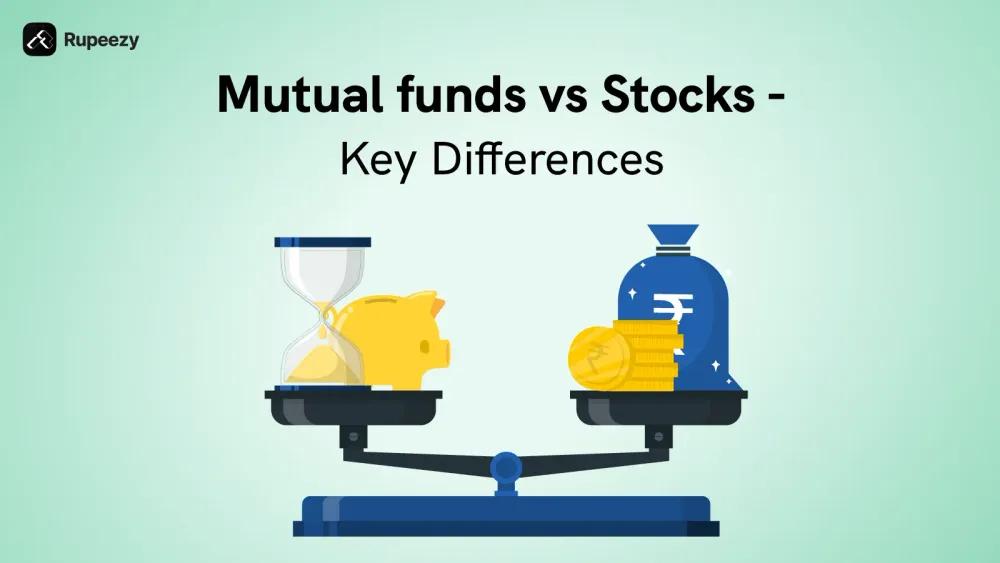Mutual Funds vs Stocks: Which Investment Option is Better?


00:00 / 00:00
Comparing mutual funds vs stocks is quite common for an investor. While both stand as great choices of investment, both are quite apart in their nature, risk, and returns. Both allow you to have a good passive income, which can be really helpful in wealth generation in the long run.
Stocks let you own a small part of a company. If the company grows, your money grows too, but the risk is higher. Mutual funds pool money from many people and invest in different stocks or bonds, managed by experts. This makes them simpler for those who do not want to track the market daily.
Now the question arises, which is better stocks or mutual funds? Well, as an investor, if you are looking for an answer, then read this guide.
What is a Stock?
Stocks are parts of a company that you can buy. When you buy a stock, you become a part-owner of that company. This means you share in its growth and profits, but also face the risk if its value goes down. Stocks are bought and sold on stock exchanges, and their prices keep changing.
The key features of the stocks that you should know are as follows:
Gives you part ownership in a company
Allows you to earn profits through a price rise (capital gains)
May provide passive income through dividends
Has high risk as prices can change quickly
Easy to buy and sell in the stock market (high liquidity)
What is a Mutual Fund?
A mutual fund is an investment scheme that collects money from many investors and invests it in different assets like stocks, bonds, or gold. It is managed by professional fund managers who aim to earn good returns for investors. Mutual funds are ideal for people who want to invest without tracking the market daily.
Some of the common features of the stocks are as follows:
Pools money from many investors
Managed by expert fund managers
Diversifies investments to reduce risk
Offers options for different goals and risk levels
Easy to start with small amounts
Key Differences Between Stocks and Mutual Funds
Once you know the basic details of both options, understanding the stocks vs mutual funds is very important. This will allow you to make the right investing decisions, which will be fruitful in the long run.
So, here is a quick view of the difference between stocks and mutual funds.
Aspect | Stocks | Mutual Funds |
Definition | Stocks represent direct ownership in a single company, giving you a share in its business. | Mutual funds pool money from many investors and invest in a mix of assets like stocks, bonds, or gold. |
Diversification | Stocks provide low diversification as you invest in individual companies unless you buy many different stocks. | Mutual funds offer high diversification because your money is spread across many assets in one fund. |
Management | Stocks are self-managed and require you to research and make investment decisions on your own. | Mutual funds are managed by professional fund managers who handle all investment decisions for you. |
Risk | Investing in stocks carries higher risk as your returns depend on the performance of individual companies. | Mutual funds have lower risk because the investments are spread across multiple assets, reducing impact if one performs poorly. |
Potential Returns | Stocks can give potentially higher returns if the companies you invest in perform well. | Mutual funds generally offer stable and consistent returns, though often lower than top-performing individual stocks. |
Minimum Investment | The minimum investment in stocks varies and depends on the price of each share. | Mutual funds often have a low minimum investment, with some funds allowing investments starting from ?500 or ?1,000. |
Liquidity | Stocks are highly liquid and can be bought or sold anytime during market hours. | Mutual funds are also liquid, but some funds may have exit loads or lock-in periods that restrict immediate withdrawal. |
Costs/Fees | Investing in stocks involves paying brokerage and transaction fees for each trade you make. | Investing in mutual funds includes management fees, administrative charges, and sometimes entry or exit loads. |
Tax Benefits | Stocks do not offer any specific tax-saving benefits under income tax rules. | Some mutual funds, like ELSS funds, offer tax benefits under Section 80C of the Income Tax Act. |
Suitability | Stocks are suitable for investors who have market knowledge, can take higher risks, and actively manage their investments. | Mutual funds are better for investors who want diversification, professional management, and a simple investment option. |
Stocks or Mutual Funds: Main Questions Answered
To decide on stock vs mutual fund which is better, it is important that one should address some questions first. These will help you to explore the details and key aspects in an even simpler and efficient manner. So, let us address some key questions over here.
Which One Matches Your Personality?
Choosing between stocks and mutual funds depends on your personality, knowledge, and comfort with risk. Here is a clear breakdown to help you decide:
1. If You Are Confident and Enjoy Active Management
Stocks suit you if you like researching companies, tracking markets, and making your own decisions. They require good financial knowledge and the ability to handle quick changes. Stocks offer higher returns but come with higher risk and volatility. This is ideal if you want full control and are ready for market ups and downs.
2. If You Prefer Professional Management and Diversification
Mutual funds are better if you want experts to handle your investments. Fund managers diversify your money across different assets, reducing risk. This option suits people who prefer a hands-off approach and do not want the stress of daily market tracking. It offers stable growth with lower risk.
3. If You Are Risk-Averse or a Beginner
Mutual funds are ideal for you. They spread your money across many securities, making them less risky than stocks. You do not need to analyse companies yourself. Starting with Systematic Investment Plans (SIPs) makes investing disciplined and accessible with smaller amounts.
4. If You Seek Higher Returns and Can Handle Volatility
Stocks are preferable if you want long-term growth and can tolerate market ups and downs. Direct stocks also avoid mutual fund fees, which can increase your net returns if you choose the right stocks. This requires active involvement and a strong risk appetite.
5. If You Want Stability and Predictability
Mutual funds are suitable if you want steady returns without daily monitoring. Diversification and professional management make them a safer choice for balanced growth.
In Summary
Choose stocks if you are an active, informed investor ready for high risk and volatility. Choose mutual funds if you prefer professional management, diversification, and a stable, passive investment route. Matching your choice to your personality and goals will help you invest with confidence and peace of mind.
Can You Combine Both in Your Portfolio?
Yes, you can combine both stocks and mutual funds in your portfolio, and it’s a smart strategy to balance growth, stability, and risk. Mutual funds offer diversification and professional management, making them ideal for long-term stability, while direct stocks provide the opportunity to invest in specific companies you believe in for potentially higher returns.
This combination allows you to customize your portfolio based on your financial goals and risk tolerance, shifting the mix over time as your needs change. By keeping the balance simple and reviewing it regularly, you can build a strong, well-rounded investment portfolio that adapts with you.
How to Start Investing (Step-by-Step for Stocks and Mutual Funds)
Now that you have decided on your choice between mutual funds vs stocks, it's time to make an investment. So, when planning to invest, you would need to follow a series of steps. The basic steps will remain the same, but there will be minor changes. So, let us explore the steps for both stocks vs mutual funds here.
Step 1: Download the Rupeezy App or Visit the Website
Begin by downloading the Rupeezy app from the Play Store or App Store. If you prefer using a laptop or desktop, visit the Rupeezy website. This platform gives you easy access to invest anytime, anywhere.
Step 2: Register and Create Your Account
Sign up by entering your name, email, mobile number, PAN, date of birth, and bank details. This step sets up your profile and links your bank account for smooth fund transfers and settlements.
Step 3: Complete KYC and eSign
Upload clear copies of your Aadhaar card, PAN card, a recent bank statement, and a selfie for identity verification. Complete the eSign process using OTP sent to your Aadhaar-linked mobile number. This ensures your account complies with SEBI regulations for secure investing.
Step 4: Wait for Account Activation
Rupeezy verifies your details within 24–48 hours. You will receive your login credentials via email or SMS once your account is approved, allowing you to start investing without delays.
Step 5: Fund Your Trading Account
Log in and transfer money from your bank account to your Rupeezy trading account. This creates your investable balance, making sure you are ready to place orders as soon as opportunities arise.
Step 6: Research Stocks or Mutual Funds Using Rupeezy Tools
Explore the app’s research tools, stock screeners, and market insights to identify stocks that match your goals and risk profile. This step helps you make informed decisions rather than random investments.
You can use Rupeezy’s filters to browse mutual funds based on categories like equity, debt, hybrid, or sector funds. Check their past performance, risk level, and objectives to select schemes that fit your financial goals.
You can either select both options at once or go with one of the options at a time. The choice totally depends on the goals and the amount that you wish to invest in.
Step 7: Decide and Place the Order
For Stocks: Select the stock you want to invest in, decide the quantity based on your budget and confidence in the stock, review all order details carefully, and place your order. You will see a confirmation once your transaction is successful.
For Mutual Funds: Decide whether you want to invest through a Systematic Investment Plan (SIP), which allows small monthly investments starting from ?100, or make a one-time lump sum investment for immediate capital deployment based on your goals.
Step 8: Make Your Investment
Enter the investment amount for your selected mutual fund, review the transaction details carefully, and complete the payment to start your investment journey with confidence.
If you plan on investing in stock, see the rate at which you are buying. Check for the number of stocks that get allotted or vice versa.
Step 9: Track and Manage Your Portfolio
Regularly check your portfolio on the app to monitor your stocks’ performance. This helps you stay updated, decide when to hold or sell, and keep your investments aligned with your financial goals.
Why Use Rupeezy?
Rupeezy offers a quick, paperless account opening process with no account opening charges. Its beginner-friendly app design, expert support, and ability to invest in both stocks and mutual funds on one platform make it a practical choice for building a balanced, goal-oriented investment portfolio confidently.
Conclusion
Choosing between mutual funds vs stocks depends on your goals, risk comfort, and how involved you want to be.
Stocks offer higher potential returns if you have the knowledge and time to track them actively. Mutual funds provide professional management and diversification, making them suitable for stable, long-term growth.
For most investors, combining both stocks and mutual funds builds a balanced portfolio that matches their financial goals with proper risk management.
FAQs
1. Is mutual funds better than stocks?
Mutual funds are better if you prefer diversification, professional management, and steady returns without tracking the market daily. Stocks can give higher returns but require time, knowledge, and higher risk tolerance. The choice between stocks vs mutual funds returns depends on your investment style.
2. What is the safest type of investment?
The safest investments include fixed deposits, government bonds, and debt mutual funds. They provide stable returns with low risk but may not match the higher returns of equity-based investments like stocks or equity mutual funds.
3. Can I invest in both stocks and mutual funds?
Yes, you can invest in both. This strategy balances your portfolio by combining the high return potential of stocks with the diversification and stability of mutual funds.
4. How much money do I need to start investing?
For stocks, you can start with the price of a single share. For mutual funds, you can begin with SIPs starting from as low as ?100 per month, making it easy for everyone to start investing.
5. Which is better for beginners: stocks or mutual funds?
For beginners, mutual funds are generally better as they are managed by experts and offer diversification, reducing risk. Stocks require market knowledge, regular tracking, and a higher risk appetite, which may be challenging for new investors.
The content on this blog is for educational purposes only and should not be considered investment advice. While we strive for accuracy, some information may contain errors or delays in updates.
Mentions of stocks or investment products are solely for informational purposes and do not constitute recommendations. Investors should conduct their own research before making any decisions.
Investing in financial markets are subject to market risks, and past performance does not guarantee future results. It is advisable to consult a qualified financial professional, review official documents, and verify information independently before making investment decisions.
Open Rupeezy account now. It is free and 100% secure.
Start Stock InvestmentAll Category









